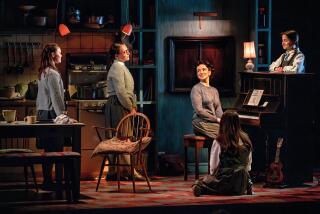‘Beautiful Ruins’ isn’t typical Hollywood novel, author says
Jess Walter’s critically acclaimed new book “Beautiful Ruins” contains many of the characters and attitudes of the classic Hollywood novel — doomed heroes and heroines lurching from troubled pasts toward impossible dreams. The bestseller, generating waves of buzz this summer, mixes key ingredients of a recipe used by such authors as Nathanael West and F. Scott Fitzgerald.
“Beautiful Ruins” features a dying American actress visiting a remote Italian isle and entrancing a local man who can barely speak English. There’s also a foul-mouthed 72-year-old film producer who, after years of cosmetic surgery, now has “the face of a nine-year-old Filipino girl,” and scenes on the set of the 1963 movie “Cleopatra,” one of the most expensive and memorable failures ever in the film industry.
But no — it’s not that kind of story, insists Walter, who’s known on the literary circuit for preceding works such as “The Financial Lives of the Poets,” which is being made into a movie starring Jack Black. “Ruins” may have a Hollywood setting and a keen eye for the foibles of the industry, but it is not a Hollywood novel per se.
“It’s so hard to trace the path of a novel, because so much is random,” Walter explained during a recent L.A. stop on his national book tour.
“This is about Italy in the 1960s, Hollywood now, Hollywood then, the Seattle music scene, the Donner party, World War II,” the Spokane-based, 47-year-old author said. “Hollywood is like a giant mirror, I think, and I used it that way in the book, reflecting characters back to themselves.”
Also reflected in the novel is Walter’s personal life. The idea for the book arose on a vacation to Italy in 1997, as Walter explored villages etched into cliffs, which illustrate the novel’s cover. At the time, his mother was terminally ill with cancer and she became the inspiration for the sick actress who begins the novel.
“I had an impulse to set her somewhere she’d never been, somewhere she never had the opportunity to travel to,” he said. “The sweep of the characters’ lives had to do with me reflecting on my mother’s life, from beginning to end. I started the book in ’62 because she would’ve been 20 then.”
The movie “Cleopatra,” which starred the love-besotted couple Elizabeth Taylor and Richard Burton, was shooting in Italy that year, he said. The novel’s intricate pieces, spanning five decades and about 4,500 miles, are also inspired by Walter’s life as a journalist, author and on-and-off screenwriter. He wrote “Ruins” over 15 years, in between finishing five books and pitching several films. Since its publication last month, “Ruins” has earned glowing reviews, including an NPR critic who called it a “literary miracle” and is moving up on coast-to-coast bestseller lists.
Though his mother isn’t a starring character, the first figure to appear, the dying actress Dee Moray, is dedicated to her. Dee’s departure from “Cleopatra” set off a ripple of complex story lines connected by one all-alluring force: the entertainment industry, Walter said.
“I’ve been simultaneously drawn to and repelled from Hollywood for years,” he said. “I wanted to explore how we’re all defining ourselves now. With Facebook and Twitter, we’re all our own little publicists in a way. And the thing we think of as Hollywood is this kind of studio system, this thing that is sort of fractured and not what it was. The novel is full of shots at the vacuous banalities Hollywood turns out.”
Some examples: One chapter (that could stand alone as a short story) is dedicated to “Donner!” — a highly detailed movie pitch that describes a group of cannibals devouring the unfortunate hero’s children. “It’s the least likely movie to ever be made,” he said, “but it reads exactly like a guy pitching a movie.”
Twisted reality shows within the text — including Midget House (“a bunch of drunk midgets in a house” and Hookbook.net (“insane people going on dates and having them filmed”) — have attracted interest from real-life producers, according to Walter.
“I think I would explode in flames of irony if I were to option an idea that I was satirizing in a novel,” he said, laughing.
So if it’s not exactly a Hollywood novel, what is it? If he had to classify it, Walter would call “Ruins” a romance, a coming-of-age, a comedy and a historical fiction. In place of moral dilemma, he writes satire with laugh-out-loud lines like, “Do you expect me to leave your father just because he is dead?”
“I’ve been told it’s too entertaining,” Walter said. “I guess if someone has to point out a flaw, that’s the best possible flaw.”
More to Read
The biggest entertainment stories
Get our big stories about Hollywood, film, television, music, arts, culture and more right in your inbox as soon as they publish.
You may occasionally receive promotional content from the Los Angeles Times.










